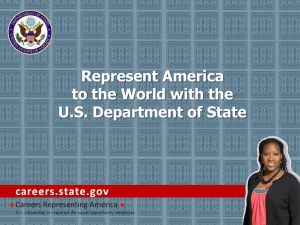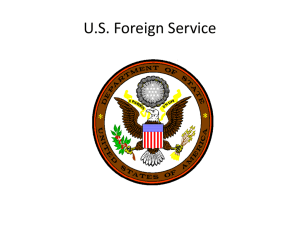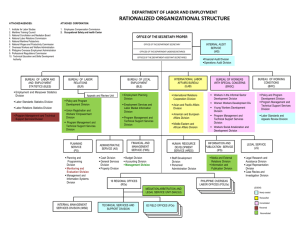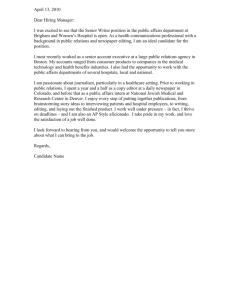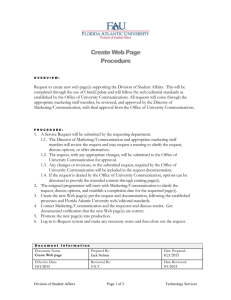04-15-09-state-presentation-updated
advertisement
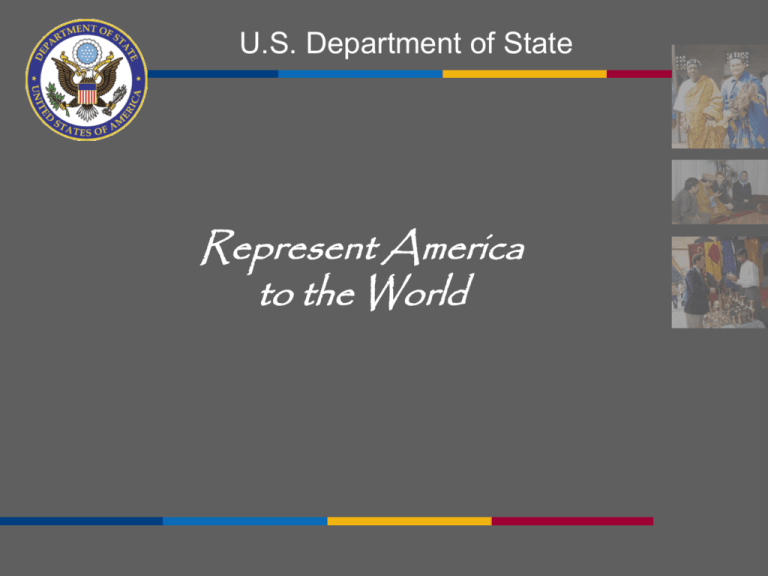
U.S. Department of State Represent America to the World U.S. Department of State History of the U.S. Department of State • The oldest cabinet agency (1789) • Thomas Jefferson was the first Secretary of State U.S. Department of State The Secretary of State leads the Department of State team that: • Serves as the principal advisor to the President on foreign policy issues • Coordinates foreign policy issues for the U.S. government • Implements the President's foreign policy decisions and programs Hillary Rodham Clinton • Protects U.S. interests abroad U.S. Department of State Who We Are Approximately 61,000 employees • 11,700 Foreign Service Americans – 6,700 Generalists – 5,000 Specialists • 9,300 Civil Service • 40,400 Foreign Service Nationals (non-US citizen employees at overseas missions) U.S. Department of State Where We Are • Over 265 posts abroad in more than 180 countries • Headquarters in Washington, D.C. • Passport agencies and various field offices are located throughout the U.S. U.S. Department of State Where We Are in the World Blue: WHA, Bureau of Western Hemisphere Affairs Orange: AF, Bureau of African Affairs Green: NEA, Bureau of Near Eastern Affairs Pink: EUR, Bureau of European Affairs Purple: SCA, Bureau of South and Central Yellow: EAP, Bureau of East Asian and Asian Affairs Pacific Affairs U.S. Department of State Organization of an Embassy President Secretary of State WASHINGTON IN COUNTRY Ambassador/ Chief of Mission Deputy Chief of Mission Management Human Resources Financial Management Logistics Information Systems Medical Community Liaison Consular Public Diplomacy American Citizens’ Services Citizenship/Passports Arrest Cases Death Cases Federal Benefits Visas Immigration Refugees Notarials Press Culture Exchanges Online Library Cultural Center Economics/Political Domestics Politics Trade Human Rights Finance Arms Control Issues Environment Narcotics Energy Telecommunications Regional Security Office (DS) Diplomatic Security: for USG people, offices, schools, housing. Security liaison with host government & USG law enforcement agencies Other Agencies AID Commerce Agriculture DOD Attaches Others: Customs, DEA, Energy, EPA, FAA, FBI, Peace Corps , Secret Service, etc. U.S. Department of State Now that you know about us, How Can You Work at State ? • Student Programs • Civil Service • Foreign Service Specialists • Foreign Service Officers U.S. Department of State Student Programs • Student Internships - Summer, Fall, and Spring in Washington and overseas • Cooperative Education Program (Co-op) • Stay-in-School Program • Student Disability Program • Summer Clerical Program Visit careers.state.gov for details U.S. Department of State Fellowships • Presidential Management Fellowship (PMF): www.pmf.opm.gov • Thomas R. Pickering Foreign Affairs/Graduate Foreign Affairs Fellowship Program: www.woodrow.org • Charles B. Rangel Fellowship Program: www.howard.edu/rjb/rangelprogram.htm U.S. Department of State Civil Service • Majority of Civil Service positions are in the United States • The Civil Service and Foreign Service both perform the same variety of functions in Washington, DC. However, the selection processes and career patterns are very different • There are two ways to apply to the Civil Service: •Apply for a particular job online through USAJobs (www.usajobs.opm.gov) •There are a limited number of entry-level positions for the Civil Service. The best tactic is to apply for all jobs for which you qualify. •Through career-entry programs: The Civil Service Career Entry Program (AKA the Federal Career Internship Program) and the Presidential Management Fellowship (PMF). U.S. Department of State Civil Service Tips • Access USAJobs through the careers.state.gov website to see State Department jobs • Familiarize yourself with www.USAJobs.gov • Create an account, including a profile & resume • Create search agent for email notification • Search widely, using different criteria • Identify the jobs you want • Check grade level and Who May Apply • Review vacancy announcement carefully • Confirm that you have necessary qualifications U.S. Department of State Civil Service Tips • • Follow the application instructions carefully Log into your USAJobs account to check application status, and follow up a few weeks after announcement closes General Schedule (GS) Guidelines for grade and qualifying education: GS-5 GS-7 GS-9 GS-11 Bachelor’s Degree 3.0 GPA upon completion of B.A. OR 1 year of Graduate-level education Master’s Degree, LLB, or JD Ph.D. or 3 years graduate education U.S. Department of State Civil Service Benefits • Competitive salaries with locality pay • Paid federal holidays • Annual and sick leave • Health/Life Insurance • Retirement system includes pension, Social Security, and Thrift Savings Plan (401k with 5% match by USG) • Flexible Spending Accounts (pre-tax medical and child care funds) • Student Loan Repayment Program • Transit subsidies • Flexible workplace/time arrangements U.S. Department of State Foreign Service • Foreign Service Officers (Generalists) and Foreign Service Specialists promote U.S. interests and protect U.S. citizens at U.S. embassies and consulate posts overseas and in Washington, DC • Foreign Service Officers work in five broad career tracks Foreign Service Specialists perform a variety of technical functions worldwide Most of the Foreign Service career is spent overseas Worldwide availability is a requirement U.S. Department of State Foreign Service Specialists •19 specialties in: • Security • Administration (e.g. Human Resources, General Services/Logistics, Financial Management, Office Management) • Construction Engineering & Facilities Management • Information Technology • Medicine and Health •Strong subject matter expertise required •Resume-based application process • Specialized Oral Assessment U.S. Department of State Foreign Service Officers FSOs declare one of the following career tracks when applying: – Consular Affairs – Economic Affairs – Management Affairs – Political Affairs – Public Diplomacy FSOs must be flexible with their international assignments U.S. Department of State How Do I Become an FSO? Foreign Service Officer Test (FSOT) Orientation Class Qualifications Evaluation Panel (QEP) Career Track Register Oral Assessment Medical & Security Clearances Final Review Panel U.S. Department of State Register for the Foreign Service Officer Test (FSOT) • Tests are given multiple times a year, with rolling registration throughout the year • Choose career track after consulting with a Diplomat-in-Residence. • Register online at careers.state.gov • The FSOT is given around the country and at overseas locations U.S. Department of State FSOT Info The Foreign Service Officer Test (FSOT) includes: – Job-related knowledge, including U.S. and world history and culture, American and foreign systems of government, and basic principles of economics – English expression and usage – Biographic information questionnaire – Written essay (scored only if the applicant passes the multiple-choice portion of the exam) U.S. Department of State FSOT Preparation Although current events are not tested directly, contemporary events may influence the topics selected for the knowledge areas and the written essay. It is expected that candidates will: – Be widely read and keep current on recent trends that may not be covered directly in a classroom environment – Read major newspapers and news magazines regularly U.S. Department of State General Knowledge Areas for FSOT English Composition Management Comparative Politics Economics International Trade and Finance U.S. History U.S. Economic History U.S. Political System U.S. Social and Intellectual History World Geography U.S. Department of State Qualifications Evaluation Panel (QEP) If you pass the written test and the essay: • You will receive an email asking you to submit a Personal Narrative in which you answer questions describing your experiences. The firm deadline for submission will be three weeks after the request is sent to you. • The panel will take a comprehensive "total candidate" approach in evaluating your qualifications for the Foreign Service in the context of your chosen career track. • The QEP determines which candidates are invited to the Oral Assessment. U.S. Department of State Oral Assessment • Components: – Group Exercise – Structured Interview – Case Management Written Exercise • Held in Washington, D.C. and elsewhere in the U.S. • Successful candidates are placed on a ranked register for their chosen career track • For more information and prep sessions contact your local Diplomats in Residence U.S. Department of State The Oral Assessment is Based on 13 Dimensions • Composure • Cultural Adaptability • Experience and Motivation • Information Integration and Analysis • Initiative and Leadership • Judgment • Objectivity and Integrity • Oral Communication • Planning and Organizing • Quantitative Analysis • Resourcefulness • Working with Others • Written Communication U.S. Department of State Key Reasons To Join the Foreign Service • • • • • Public service Overseas lifestyle Challenging work Lifelong learning Constant variety and change • Learn foreign languages U.S. Department of State Foreign Service Benefits Include: • Competitive Salary • Retirement plan at age 50 (with 20 years of service) • Language and other Training • Host country holidays (up to 20 total)* • Housing* • Cost of Living Allowance* • Financial Incentives • Children's Education Allowance* • Paid Home Leave* • Rest and relaxation travel* • Student Loan Repayment Program* * Overseas only U.S. Department of State Reflect America to the World We seek a diverse group of talented Americans for the State Department, with experiences and perspectives in a variety of areas. All academic disciplines are useful in the State Department. U.S. Department of State Questions? Resource Reminder: • http://careers.state.gov • Diplomats in Residence
